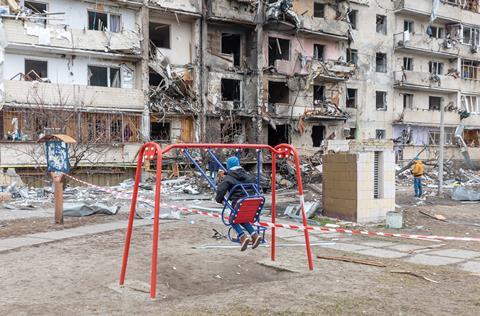- News

All the latest updates on building safety reformRegulations latest
- Focus
- Home
- News
- Focus
- Comment
- Events
- CPD
- Building the Future
- Jobs
- Data
- Subscribe
- Building Boardroom
Ukraine: a tragedy and crisis beyond belief with an impact felt all over the world
By Dave Rogers2022-03-15T07:00:00

Everybody is worried about events in Ukraine, from a humanitarian viewpoint to the detail of firms navigating the impact on their cost base

Source: Shutterstock
A semblance of normality for one Ukrainian child outside a residential building damaged by Russian rockets in a residential district of Kyiv
A month ago, I would have been a lot more confident.” The chief executive of Keller, Michael Speakman, is talking about the outlook for the rest of this year.
He may as well have been speaking for everybody, to be honest. With the Omicron variant of covid-19 on the wane, some consensus that materials peaks and troughs had finally plateaued and the general sense that normality was returning, industry optimism was on the up.
Then, on 24 February, Russia did exactly what it had said it would not do: it invaded Ukraine. The days and weeks since have suddenly made people feel rather nostalgic for covid-19 given that Russia’s president, Vladimir Putin, had – just a few days into the conflict – suggested using nuclear weapons was not a red-line issue for him.
…
Already registered? Login here
To continue enjoying Building.co.uk, sign up for free guest access
Existing subscriber? LOGIN
Stay at the forefront of thought leadership with news and analysis from award-winning journalists. Enjoy company features, CEO interviews, architectural reviews, technical project know-how and the latest innovations.
- Limited access to building.co.uk
- Breaking industry news as it happens
- Breaking, daily and weekly e-newsletters
Get your free guest access SIGN UP TODAY

Subscribe now for unlimited access
Subscribe to Building today and you will benefit from:
- Unlimited access to all stories including expert analysis and comment from industry leaders
- Our league tables, cost models and economics data
- Our online archive of over 10,000 articles
- Building magazine digital editions
- Building magazine print editions
- Printed/digital supplements
Subscribe now for unlimited access.
View our subscription options and join our community

















